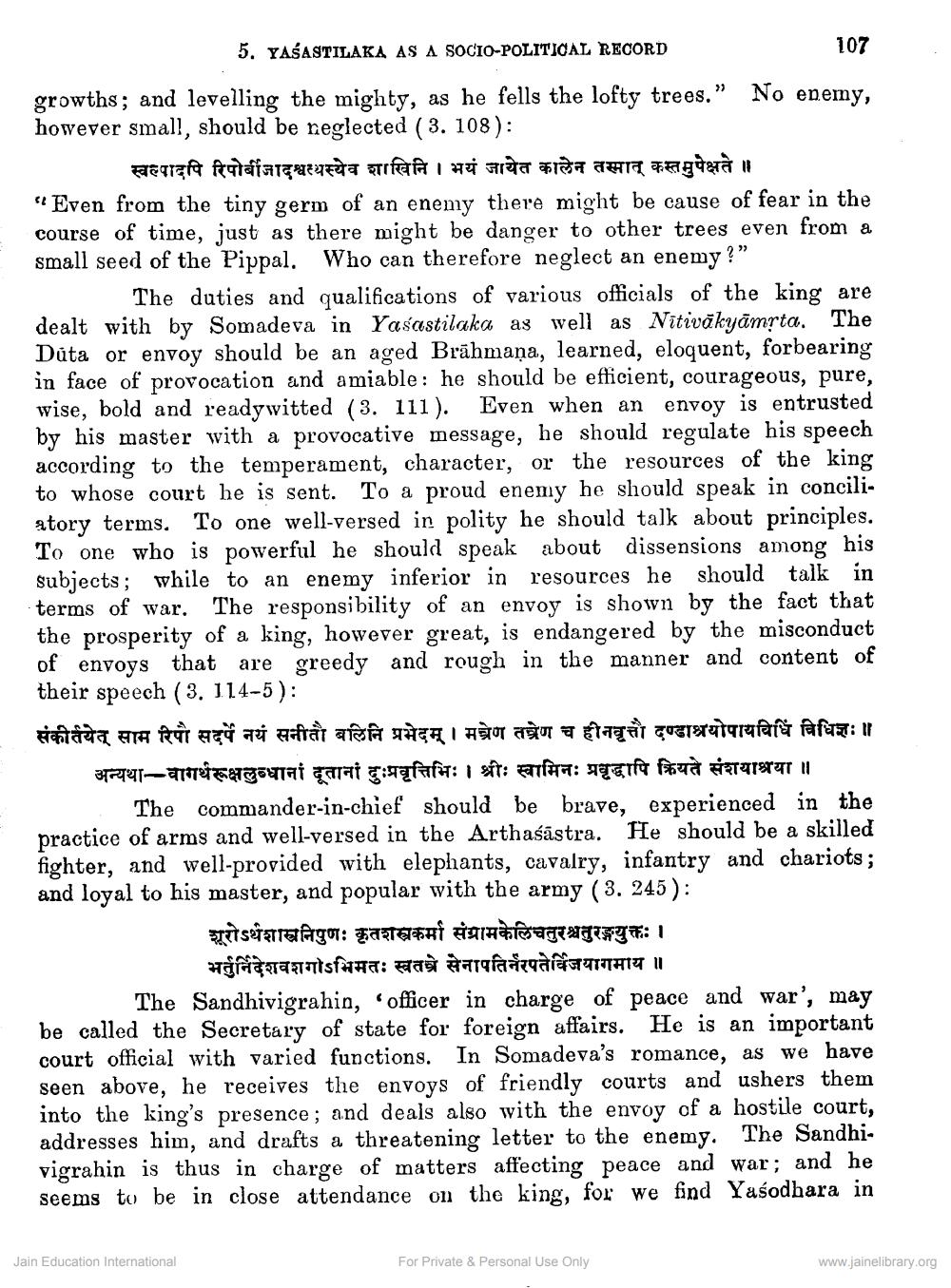________________
5. YAŠASTILAKA AS A SOCIO-POLITICAL RECORD
107 growths; and levelling the mighty, as he fells the lofty trees." No enemy, however small, should be neglected (3. 108):
स्वल्पादपि रिपोर्बीजादश्वस्थस्येव शाखिनि । भयं जायेत कालेन तस्मात् कस्तमुपेक्षते ॥ "Even from the tiny germ of an enemy there might be cause of fear in the course of time, just as there might be danger to other trees even from a small seed of the Pippal. Who can therefore neglect an enemy?”.
The duties and qualifications of various officials of the king are dealt with by Somadeva in Yasastilaka as well as Nitivăkyāmrta. The Duta or envoy should be an aged Brāhmaṇa, learned, eloquent, forbearing in face of provocation and amiable: he should be efficient, courageous, pure, wise, bold and readywitted (3. 111). Even when an envoy is entrusted by his master with a provocative message, he should regulate his speech according to the temperament, character, or the resources of the king to whose court he is sent. To a proud enemy he should speak in conciliatory terms. To one well-versed in polity he should talk about principles. To one who is powerful he should speak about dissensions among his subjects; while to an enemy inferior in resources he should talk in terms of war. The responsibility of an envoy is shown by the fact that the prosperity of a king, however great, is endangered by the misconduct of envoys that are greedy and rough in the manner and content of their speech (3. 114-5): संकीर्तयेत् साम रिपो सदर्प नयं सनीतौ बलिनि प्रभेदम् । मन्त्रेण तन्त्रेण च हीनवृत्तौ दण्डाश्रयोपायविधि विधिज्ञः॥
अन्यथा-वागर्थरूक्षलुब्धानां दूतानां दुःप्रवृत्तिभिः । श्रीः स्वामिनः प्रवृद्धापि क्रियते संशयाश्रया ॥
The commander-in-chief should be brave, experienced in the practice of arms and well-versed in the Arthaśāstra. He should be a skilled fighter, and well-provided with elephants, cavalry, infantry and chariots; and loyal to his master, and popular with the army (3. 245):
शूरोऽर्थशास्त्रनिपुणः कृतशस्त्रकर्मा संग्रामकेलिचतुरश्चतुरङ्गयुक्तः ।
भर्तुनिदेशवशगोऽभिमतः स्वतने सेनापतिर्नरपतेर्विजयागमाय ॥
The Sandhivigrahin, officer in charge of peace and war', may be called the Secretary of state for foreign affairs. He is an important court official with varied functions. In Somadeva's romance, as we ha seen above, he receives the envoys of friendly courts and ushers them into the king's presence; and deals also with the envoy of a hostile court, addresses him, and drafts a threatening letter to the enemy. The Sandhi. vigrahin is thus in charge of matters affecting peace and war; and he seems to be in close attendance on the king, for we find Yasodhara in
Jain Education International
For Private & Personal Use Only
www.jainelibrary.org




